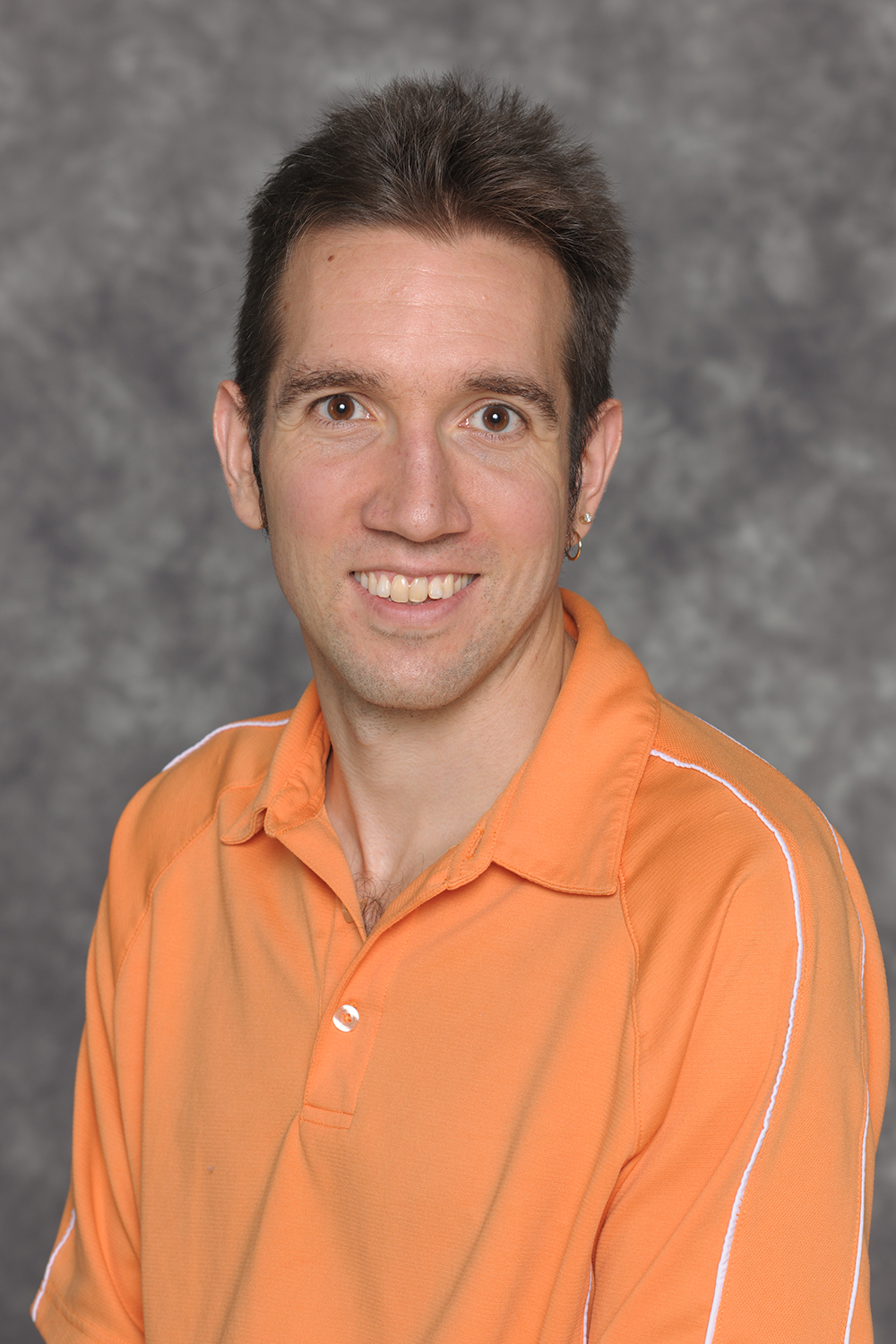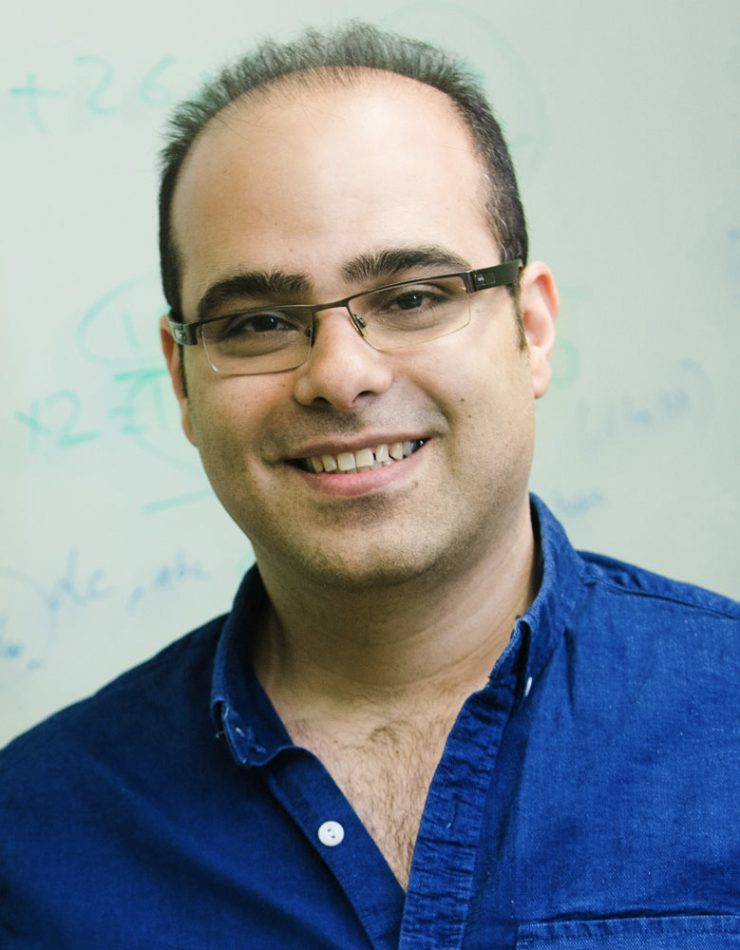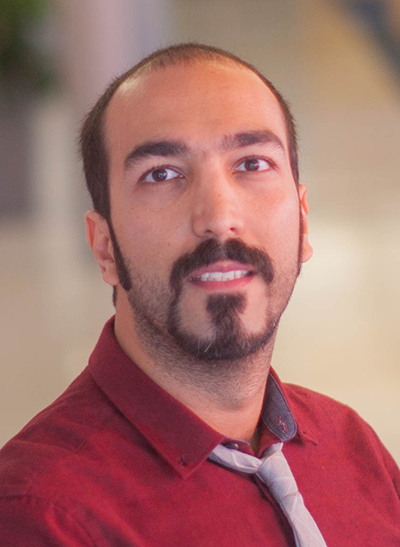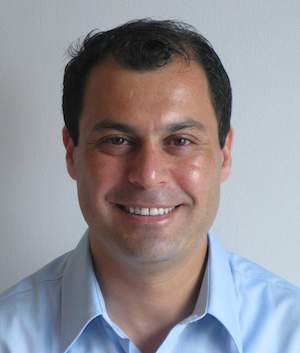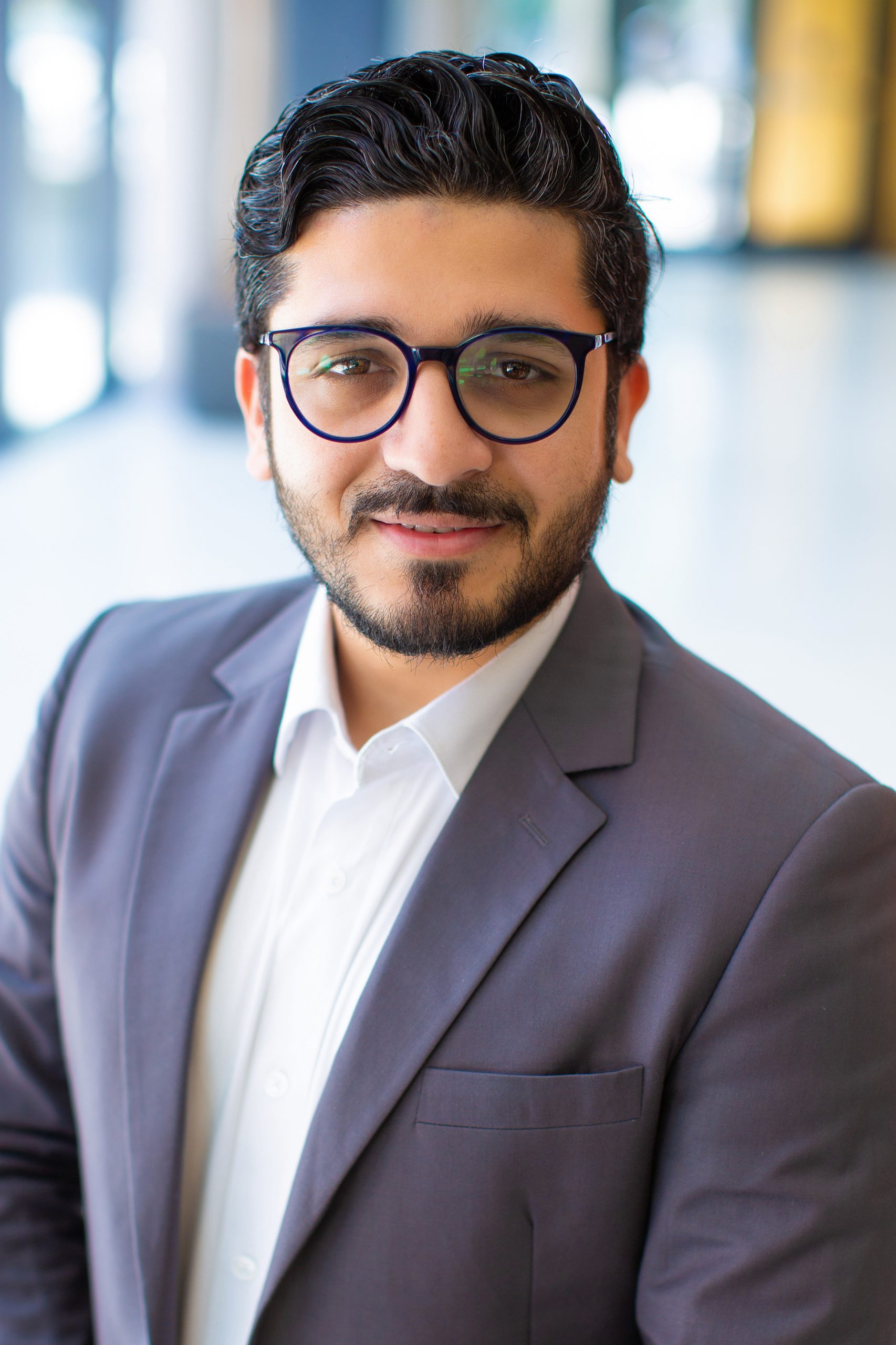Janki Bhimani
Assistant Professor
Applied Machine Learning Janki Bhimani’s primary research focus revolves around...
Christian Poellabauer
Professor, Knight Foundation School of Computing & Information Sciences
Interim Associate Dean for Research and Graduate Studies, College of Engineering & Computing
Dr. Poellabauer is a full professor in the Knight Foundation...
Trevor Cickovski
Assistant Professor
Microbiome, GPU computing, Network Analysis Dr. Trevor Cickovski received his...
Robert H. Hacker
Adjunct Professor
Robert Hacker is the Co-founder and Director of StartUP FIU,...
Hyeyoung Hah
Associate Professor, Information Systems and Business Analytics
Hyeyoung Hah received a B.S. degree in Statistics from Dongguk University,...
Sitharama S. Iyengar
Distinguished University Professor
Computational Sensor Networks, Parallel and Distributed Algorithms and Data Structures,...
John Stuart
Distinguished University Professor, Department of Architecture
John Stuart has been on the faculty at Florida International...
Amin Kharraz
Assistant Professor
Empirical system security and privacy, Malware Detection, Code Analysis, and...
Agoritsa Polyzou
Assistant Professor
Dr. Agoritsa Polyzou is an Assistant Professor of Computer Science...
Pouyan Esmaeil Zadeh
Associate Professor, Department of Information Systems and Business Analytics
Dr. Esmaeil Zadeh has established a line of research at...
Gregory Murad Reis
Assistant Teaching Professor
Aquatic Robots, Persistent Ocean Monitoring, Artificial Intelligence Dr. Gregory Murad Reis received...
Naphtali D. Rishe
Professor
Geographic Information Systems, Database Management, Health Informatics Dr. Rishe has...
Selcuk Uluagac
Eminent Scholar Chaired Professor
Security and privacy of IoT/CPS, ransomware, malware, forensics and their...
Mo Sha
Associate Professor
Applied Machine Learning, Internet of Things, Cyber-Physical Systems, Network Security...
Umair Usman
Assistant Professor of Marketing, Department of Marketing and Logistics
Dr. Usman studies consumers’ responses to new technologies in marketing...
Himanshu Upadhyay
Principal Scientist
Artificial Intelligence, Big data, Cyber Analytics/Visualization, Malware Analysis and Blockchain...
Walfried M. Lassar
Department of Marketing and Logistics
Dr. Lassar is a Professor of Marketing and holds the...
Janki Bhimani
Applied Machine Learning
Janki Bhimani’s primary research focus revolves around Flash-Based Storage Systems, Big Data Processing, Cloud Computing, High-Performance Computing, and Parallel and Distributed Computing. Her research interest also includes Performance Modeling, Resource Management, and Capacity Planning for various emerging inter-disciplinary research domains. With her extraordinary expertise and extensive experience in the field of new emerging flash-based storage systems and devices, she has made significant contributions to the data storage management community. She is the recipient of the Outstanding Graduate Research Award of 2019 from Northeastern University. She also received Best Paper Awards from flagship conferences. Her work is published in highly selective conferences and journals. She is also the main inventor of top graded patents. Hand-in-hand with her research, she is very passionate about teaching and mentoring. Prior to joining at Florida International University, she previously served Northeastern University as an instructor. She also closely worked with research scientists at Samsung Semiconductor Research Labs towards evolving flash-based SSDs. In her free time, Janki is a creative visual artist. Far from home, amidst nature, she finds her inspiration to paint. She enjoys understanding the impact of art on human psychology, and she can painterly bring motivation, healing, and encouragement through the canvas.
See more about Dr. Bhimani here: Janki Bhimani – Data Management Research Laboratory (fiu.edu)
Christian Poellabauer
Dr. Poellabauer is a full professor in the Knight Foundation School of Computer and Information Sciences and the Interim Associate Dean for Research and Graduate Studies in the College of Engineering and Computing at Florida International University.
He received his Ph.D. in Computer Science in 2004 and served on the faculty of the University of Notre Dame for 17 years before joining FIU in 2021.
At FIU, he leads the MOSAIC (Mobile Sensing and Analytics) Lab, which focuses on research topics such as digital health, wireless sensing, machine learning and artificial intelligence using time series data, the Internet-of-Things, and cybersecurity.
Most current research projects focus on the use of machine learning for health, e.g., leveraging data obtained from wireless sensors, wearable devices, or mobile devices to develop new tools for diagnosis and treatment of medical conditions such as neurodegenerative diseases, neurodevelopmental conditions, mental health problems, cardiovascular problems, etc.
His research has been funded by the NSF, NIH, Department of Defense, Department of Education, Toyota, Ford Research, the National Football League, National Geographic, GE Health, and IBM, among others. He was the recipient of an NSF CAREER Award in 2006 and named a Fulbright Scholar in 2018.
Project 1: Towards a Personalized Physical Intervention Recommender System for Parkinson’s Disease

Summary: Neurodegenerative conditions, such as Parkinson’s Disease (PD), affect regions in the brain that play a key role in cognitive and motor function, leading to impairments of movement, speech production, memory, reasoning, planning, reflexes, among others. Assessment of disease state is essential in both clinical practice and research in order to measure disease severity, disease progression, and treatment effectiveness. Currently, the clinical assessment of PD relies primarily on subjective evaluations, such as rater-based interviews and questionnaires and tests such as simple rhythmic activities to evaluate motor symptoms and tremor. With the wealth of new mobile technologies, their sensor capabilities, and the resulting data, there are new opportunities to develop digital biomarkers that translate these new data sources into informative, actionable insights. This work utilizes advances in sensing, analytics, and machine learning to design integrated function-specific biomarkers that can provide fine-grained insights into a patient’s disease course for various neurological functions such as cognitive skills, fine and gross motor functions, speech/language, etc. This work also uses the newly developed biomarkers to investigate the effects of various intervention types on functional performance.
Project 2: Assessing Trauma Response of First Responders Using Physiological Biomarkers
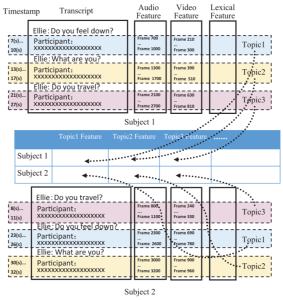
Summary: In the U.S. alone, over 20% of adults experienced a mental illness in 2019; a problem that has only worsened with the current pandemic. Mental health conditions, which include post-traumatic stress disorder, depression, suicidal ideation, and substance use disorder, are even more common among first responders. While first responders undergo extensive training, their demanding jobs often expose them to potentially traumatic events that can lead to short- and long-term mental health problems. This project will develop a continuous multi-modal mental health sensing and analysis framework able to detect subtle changes in psychological health using physiological sensor streams from wearable devices, specifically focusing on stress responses immediately after exposure to trauma, i.e., acute stress disorder (ASD) and acute post-traumatic stress disorder (PTSD). This approach will be able to detect and predict the occurrence of ASD and PTSD and provide an early alert mechanism that notifies first responder to seek help proactively.
Project 3: Assessing the Impact of Cancer Treatment on Autonomic Nervous System Function of Cancer Survivors

Summary:Dysautonomia is an umbrella term referring to a group of several medical conditions that cause a malfunction of the Autonomic Nervous System (ANS). Cancer can affect the ANS in a variety of ways and while cancer therapies have increased patient survival rates, their side effects (such as cardiotoxicity and neurotoxicity) can lead to autonomic nervous and cardiovascular system dysfunction. Autonomic dysfunction is an emerging, but also poorly understood topic. While it has been suggested as a risk factor for cardiovascular disease in breast cancer patients, there are gaps in the current knowledge and more research is needed to identify severity, predictors, and clinical correlates of cancer-related dysautonomia. Further, more research is needed to define beneficial interventions, e.g., exercise programs appear to promote physiological changes helping to reduce the decline of the autonomic modulation. This study aims to use a combination of frequent patient self-reports and continuous physiological measurements (based on wearable sensor technologies) to monitor dysautonomia in cancer patients and to analyze the effectiveness of various exercise programs.
Project 4: Speech-Based Diagnosis of Neurological Trauma
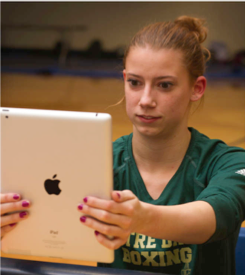
Summary: Mild traumatic brain injuries (mTBI) such as concussions are arguably one of the most pressing concerns in sports today, with an estimated 2-4 million cases every year in youth sports alone. The potential short- and long-term impacts on the health and well-being of individuals with brain injuries are extensive. For example, individuals with mTBI may display a range of somatic, affective, and cognitive symptoms such as headaches, depression, loss of memory, and loss of brain function (collectively known as Post Concussion Syndrome). The effects of untreated concussions, e.g., leading to diseases such as chronic traumatic encephalopathy (which has been tied to depression and suicide), an elevated incidence of Alzheimer Disease (and a reduced age of onset for Alzheimers), and dementia developing at a higher rate and a younger age. It is therefore imperative to accurately detect and appropriately treat mTBI, especially among adolescents, whose brains are still developing and more prone to long-term damage. This research aims to identify a novel biomarker that can only be extracted and utilized using modern computing and speech analysis technology. Prior research has provided evidence of a link between neurological functioning and acoustic features of the human voice, but these links are so subtle that they have been difficult to capture. Our findings will provide the foundation for a new generation of mTBI assessment tools utilizing advances in mobile technology and speech processing.
Trevor Cickovski
Microbiome, GPU computing, Network Analysis
Dr. Trevor Cickovski received his Ph.D. from the University of Notre Dame in 2008. He holds Graduate Faculty status and specializes in teaching hardware and Unix coursework, and is IRB-certified and a member of the Bioinformatics Research Group (BioRG) at FIU. He also is a member of the ACM, IEEE, and the National Learning Assistant Alliance (LAA). He has received funding from NIJ (epigenetics), and NSF (machine learning and Covid-19 vaccine discovery). Trevor is lead software developer of PluMA, facilitating natural progress by allowing construction of new ideas as plugins in a choice programming language.
Trevor is passionate about health and explores roles played the microbiome in maintaining homeostasis. Microbiomes have enormous influence given their ubiquity and involvement in host metabolic reactions. He has explored connections with ADHD, A1AD, COPD, smoking, and red tides using multi-omics approaches that integrate DNA, RNA and metabolites through large-scale processing, GPUs, and network analyses. He has several peer-reviewed publications including JMM, LNBI, Bioinformatics, BMC, ICCABS, IWBBIO, and ACM TCBB. He has received funding from NIJ (epigenetics), and NSF (machine learning and Covid-19 vaccine discovery). Trevor is lead software developer of PluMA, facilitating natural progress by allowing construction of new ideas as plugins in a choice programming language. These can be uniformly tested alongside other plugins and committed to a centralized plugin pool. The PluMA plugin pool has grown from 70 to 225+ plugins from 2019 to 2020, and continues to grow.
See more about Dr. Cickovski here: Trevor Cickovski’s Webpage (fiu.edu)
Robert H. Hacker
Robert Hacker is the Co-founder and Director of StartUP FIU, where he focuses on commercializing faculty research in emerging technologies and curriculum innovation. He is a professor in the Honors College at FIU and he previously taught at MIT Sloan. He teaches courses in social entrepreneurship, mental frameworks in decision making and the Fourth Industrial Revolution. He previously was the COO/CFO of One Laptop per Child, an international social venture started at the MIT Media Lab. He also built a billion dollar publicly-traded company in Indonesia. He is the author of two books on entrepreneurship.
See more about Prof. Hacker here: Robert H. Hacker – StartUP FIU
Hyeyoung Hah
Hyeyoung Hah received a B.S. degree in Statistics from Dongguk University, Seoul, South Korea in 2000, an M.S. degree in Consumer Behavior from Purdue University, West Lafayette, IN, USA in 2008, and a Ph.D. degree in Information Systems from Emory University, Atlanta, GA, USA in 2016. She is currently an Associate Professor at Florida International University, Miami, FL, USA. She has authored 18 publications in the referred journals and conference proceedings. She is a recipient of the best paper runner-up award at the International Conferences on Information Systems (ICIS) in 2012. Recently, her work was nominated for the best paper award at the Hawaiian International Conference on System Sciences (HICSS) in 2020. Her research interests lie in the adoption and impact of digital innovation on various performance metrics in the contexts of healthcare, mobile platforms, finance, and e-commerce in general, and AI-driven decision-making and Internet of Medical Things (IoMT) in specific.
Projects:
- Empowering Citizens’ Self-Health Management via Shoe-based Sensor Technology and Internet of Medical Things
- Brief Description: The project focuses on enhancing citizens’ self-health management skills in everyday situations. The primary objectives include designing and evaluating citizen-focused Internet of Medical Things (IoMT) artifacts and identifying barriers and enablers of citizens’ IoMT use. The methodologies employed in the project encompass Applied Science Engineering (AS/E), Design Science, Empirical Econometrics, and Psychometrics. The ultimate impact of the project is to improve the accessibility and applicability of IoMT technologies and devices, enabling everyday citizens to manage their health effectively between doctor’s visits.
Sitharama S. Iyengar
Computational Sensor Networks, Parallel and Distributed Algorithms and Data Structures, Software for Detections of Critical Events, Autonomous Systems and Distributed Systems
Dr. S.S. Iyengar is currently the Distinguished University Professor, Ryder Professor of Computer Science and a former Director of the Knight Foundation School of Computing and Information Sciences at Florida International University (FIU), Miami. He is also the founding director of the Discovery Lab. Prior to joining FIU, Dr. Iyengar was the Roy Paul Daniel’s Distinguished Professor and Chairman of the Computer Science department for over 20 years at Lousiana State University. He has also worked as a visiting scientist at Oak Ridge National Lab, Jet Propulsion Lab, Satish Dhawan Professor at IISc and Homi Bhabha Professor at IGCAR, Kalpakkam and University of Paris and visited Tsinghua University, Korea Advanced Institute of Science and Technology (KAIST) etc. His research interests include High-Performance Algorithms, Biomedical Computing, Sensor Fusion, and Intelligent Systems for the last four decades. His research has been funded by the National Science Foundation (NSF), Defense Advanced Research Projects Agency (DARPA), Multi-University Research Initiative (MURI Program), Office of Naval Research (ONR), Department of Energy / Oak Ridge National Laboratory (DOE/ORNL), Naval Research Laboratory (NRL), National Aeronautics and Space Administration (NASA), US Army Research Office (URO), and various state agencies and companies. He has served on the US National Science Foundation and National Institute of Health Panels to review proposals in various aspects of Computational Science and has been involved as an external evaluator (ABET-accreditation) for several Computer Science and Engineering Departments across the country and the world. Dr. Iyengar has also served as a research proposal evaluator for the National Academy of Engineering. Dr. Iyengar is developing computational measures for predicting DNA mutations during cancer evolution, using wavelet analysis in cancer genome research, and designing smart biomarkers for bioremediation. His inventions have significantly impacted biomedical engineering and medicine. He recently patented a simple, low-cost device for early intervention in glaucoma, and was involved in early detection of lung cancer by developing a 4D motion model jointly with Southwestern Medical School.
See more about Dr. Iyengar here: Dr. S.S. Iyengar (fiu.edu)
John Stuart
John Stuart has been on the faculty at Florida International University for 30 years, overseeing collaborative innovation spaces focused on 3D printing and volumetric capture. With over three decades in Miami Beach, Stuart is a registered architect heavily involved in the community. He has served for nearly a decade on the Miami Beach Historic Preservation Board, which he currently chairs. Stuart’s interdisciplinary research examines the intersections of design, historic preservation, resilience, and technology. He is working with Dr. Giri Narasimhan on “AI and Miami Beach’s Historic Districts: Developing Tools in Support of a Resilient Urban Future.” Stuart co-chairs an EDUCAUSE Community of Practice study group on AI and ethics as part of an EDUCAUSE framework for AI Literacy and Ethical Guidelines. In 2022, he co-organized “The Inclusive Campus of the Future: DEI, Extended Reality and Student Success in Minority-Serving Institutions,” (ilxr.fiu.edu) featuring international conversations about XR, identity, and the AI technologies that will support them. Recently, Stuart co-chaired FIU’s working group on Mission-aligned Engagement and Partnerships for its 2030 Strategic Plan. His work with graduate architecture students explores resiliency policies and strategies for Miami Beach’s Historic Districts, engaging AI in envisioning the future of equitable, resilient, and sustainable historic communities.
Project 1: AI, Climate Change, and Miami Beach’s Resilient Urban Future
Authors: Giri Narasimhan (FIU), John Stuart (FIU), Debbie Tackett (City of Miami Beach)
Summary: The core functionality of our AI tool will include identifying and cataloging critical architectural features of historic buildings, such as architect, date, size, type, construction materials, design elements, and any permitted updates or changes.
The tool will employ advanced pattern recognition algorithms to analyze large datasets, integrating information from various sources like historical records, architectural databases, environmental databases related to building elevations, tide predictions, sea level rise predictions, and nearby city infrastructure, roads, drains, landscape elements, etc.
Ultimately, this tool will be able to uncover patterns across the city of building structural vulnerabilities and degradation patterns, considering factors like age, materials, historic preservation status, environmental conditions, and the potential for resiliency measures in facades, environmental systems, and land use.
This will help public and private building owners make more informed decisions as they attempt to make our historic neighborhoods more resilient.
Project 2: EDUCAUSE-HP AI Community of Practice
Summary: EDUCAUSE and HP have collaborated to establish a community of practice dedicated to leaders and practitioners who are innovating in their application of artificial intelligence (AI) for teaching and learning purposes.
This community of practice focuses on three key aspects:
– Examining the approach to building and fostering the community itself.
– Reviewing and prioritizing the topics that are most important for discussion within the community.
– Developing and sharing three essential resources created by members of the group:
a. An AI literacy framework that can be adapted and applied to train faculty, staff, or students.
b. An ethical framework to guide campus policies and practices related to AI.
c. Guidelines addressing data privacy concerns in the context of AI implementation.
By participating in this community of practice, members can explore best practices, share insights, and collaborate on the development of resources that support the responsible and effective use of AI in educational settings.
Amin Kharraz
Empirical system security and privacy, Malware Detection, Code Analysis, and Web and Browser Security
Dr. Amin Kharraz research focuses on building systems to facilitate a data-driven approach to security. The primary goal of Dr. Amin is to apply this methodology to rigorously analyze the behavior of online attacks and facilitate developing platforms to discover and mitigate these attacks in a scalable and reliable manner. The problems that Dr. Amin tackles often involve the intersection of society, technology, and security.
See more about Dr. Kharraz here: Amin Kharraz – Research in Systems Security
View Dr. Kharraz’s projects here: Prof. Amin Kharraz Projects
Agoritsa Polyzou
Dr. Agoritsa Polyzou is an Assistant Professor of Computer Science in the Knight Foundation School of Computing and Information Sciences at Florida International University (FIU). Before joining FIU, she was a postdoctoral Fritz family fellow in the Massive Data Institute (MDI) of McCourt School of Public Policy at Georgetown University. She received her Ph.D. in Computer Science and Engineering from the University of Minnesota in 2020, and her Bachelor in Computer Engineering and Informatics from the University of Patras, Greece. She is engaging in projects at the intersection of big data, machine learning, ethics, and fairness. Her research interests include data mining, recommender systems, the application of machine learning techniques within educational contexts, and the fairness concerns that arise from their use. Her goal is to help students succeed using data and machine learning models. At the same time, she is interested in ensuring that such models will be fair and responsible.
Pouyan Esmaeil Zadeh
Dr. Esmaeil Zadeh has established a line of research at the intersection of information systems and health informatics, focusing on the impact of health information technology (HIT) and emerging technologies on the performance of health systems, improving the quality and efficiency of care delivery and enhancing the engagement of patients in managing their care. His main research objective is to study various HIT systems to offer technological solutions for enhancing health information exchange (HIE) across providers, care coordination, healthcare providers’ workflows, system security, patient safety, the completeness and accuracy of medical records, and healthcare interoperability standards. He is also interested in other research domains, including Nonfungible Tokens (NFTs), blockchain-based platforms, Artificial Intelligence (AI) and Machine Learning (ML), Robotics, Health app development, and Metaverse. His work appears in premier Information Systems and Health Informatics journals such as Information and Management, International Journal of Medical Informatics, Journal of Medical Internet Research, Journal of Biomedical Informatics, BMC Medical Informatics and Decision Making, Communications of the Association for Information Systems, Computers and Security, Information Technology & People, and Methods of Information in Medicine. He was appointed to a Knight-Ridder Center Research Fellowship in August 2021. He also received the Fulbright Award from the Canada-US Fulbright Program for the 2022-2023 academic year.
Gregory Murad Reis
Aquatic Robots, Persistent Ocean Monitoring, Artificial Intelligence
Dr. Gregory Murad Reis received his Ph.D. degree in Computer Science at Florida International University in 2018, and his Master’s degree in Systems Engineering and his Bachelor’s degree in Computer Science from Federal University of Lavras, Brazil, in 2014 and 2012, respectively.
He completed his Ph.D. as a Science without Borders fellow, sponsored by federal agencies NSF, ONR, CAPES, and LASPAU (Harvard University).
With 19 years of experience in teaching, Dr. Reis has taught Mathematics and Computer Science courses for several undergraduate programs and schools. Moreover, he has experience in early, elderly and special education. In his career, Gregory has mentored over fifty students, including high school teachers and undergraduate and master’s students in several programs, such as Science without Borders’s Summer Research Program, NSF’s Research Experience for Undergraduates (REU) and NSF’s Research Experience for Teachers (RET).
Gregory has published several papers in conferences and journals. His current research interests are centered on the challenges of marine robotics and STEM Education. Key problems he has addressed so far include localization and navigation of aquatic robots in GPS-denied environments, analysis of the spatiotemporal dynamics of the ocean, and the development of new technologies for environmental monitoring.
Gregory has also served as the Robotics Coach for the Ultimate Software Academy for Computer Science Education for over 4 years, teaching professional development courses in robotics and coding for K-12 teachers in the Miami-Dade County Public Schools (M-DCPS). He is currently transforming the K-12 curriculum by including project-based robotics activities and competitions.
See more about Dr. Reis here: Gregory Reis
View Dr. Reis’ projects here: Prof. Gregory Murad Reis Projects
Naphtali D. Rishe
Geographic Information Systems, Database Management, Health Informatics
Dr. Rishe has authored 6 books and edited 7 books on database management, location-based data, health informatics, and high performance computing. He is the inventor of 8 U.S. patents on database querying, semantic database performance, Internet data extraction, and computer medicine. Rishe has authored 300 papers in journals and proceedings on databases, software engineering, Geographic Information Systems, Internet, and life sciences. He was awarded over $55 million in research grants by Government and Industry, including NSF, NASA, IBM, DoI, DHS, USGS. Rishe is the Founder and Director of the High-Performance Database Research Center at FIU (HPDRC) and of the NSF International FIU-FAU-Dubna-Greenwich Industry-University Cooperative Research Center for Advanced Knowledge Enablement (I/UCRC). Rishe is the inaugural FIU Outstanding University Professor and Eminent Chair Professor in Computer Science.
See more about Dr. Rishe here: Dr. Naphtali David Rishe (fiu.edu)
Selcuk Uluagac
Security and privacy of IoT/CPS, ransomware, malware, forensics and their applications to AI/ML, adversarial ML
Mo Sha
Applied Machine Learning, Internet of Things, Cyber-Physical Systems, Network Security and Wireless Networking
Dr. Mo Sha is an Associate Professor in the Knight Foundation School of Computing and Information Sciences at Florida International University (FIU). Before joining FIU, he was an Assistant Professor in the Department of Computer Science at Binghamton University – State University of New York. His research interests include wireless networking, Internet of Things, applied machine learning, network security, and cyber-physical systems. He published more than 50 research papers, served on the technical program committees of 16 premier conferences, and reviewed paper for 21 journals. He received the NSF CAREER award in 2021, the NSF CRII award in 2017, and the Educator of the Year in Computer Science award and the Career Champion award at Binghamton University in 2018. He is a senior member of IEEE, a senior and lifetime member of ACM, and a member of Sigma Xi.
See more about Dr.Sha here: Mo Sha’s Homepage (fiu.edu)
View Dr.Sha projects here: Prof. Mo Sha Projects
Umair Usman
Dr. Usman studies consumers’ responses to new technologies in marketing using experimental research designs. He is currently working on projects related to generative AIs and has published an article on Behavioral Research on AI in Marketing recently in Foundations and Trends in Marketing.
Projects:
- Artificial Intelligence in Marketing and Consumer Behavior Research
- Brief Description: This project reviewed the behavioral research on AI in marketing and presented a synthesis of what the current trends are, including the predominant dependent variables being measured by researchers, theories being used to explain the findings and the types of behavioral research design used in the research. The manuscript concludes with our key observations and identifies future research directions, raises interesting questions that are yet to be answered by behavioral research on AI in marketing, and suggests means to enhance the methodology and behavioral research designs currently being used in marketing.
View Article: TaeWoo Kim, Umair Usman, Aaron Garvey and Adam Duhachek (2023), “Artificial Intelligence in Marketing and Consumer Behavior Research”, Foundations and Trends® in Marketing: Vol. 18: No. 1, pp 1-93.
- Brief Description: This project reviewed the behavioral research on AI in marketing and presented a synthesis of what the current trends are, including the predominant dependent variables being measured by researchers, theories being used to explain the findings and the types of behavioral research design used in the research. The manuscript concludes with our key observations and identifies future research directions, raises interesting questions that are yet to be answered by behavioral research on AI in marketing, and suggests means to enhance the methodology and behavioral research designs currently being used in marketing.
- The Persuasive Power of AI Ingratiation: A Persuasion Knowledge Theory Perspective
- Brief Description: This research examines the emerging marketing tactic of AI ingratiation of humans and reveals that AI ingratiation leads to increased consumer acceptance of product recommendations. Using behavioral experiments, including online studies and a real human-AI interaction, we show that these ingratiation effects are moderated by the extent to which AI is anthropomorphized. Our findings advance the current knowledge about human-AI interaction in consumption contexts and finds support for our hypotheses based on the Persuasion Knowledge Model and Anthropomorphism literature. Specifically, we find that consumers perceive ingratiation by human-like (vs. machine-like) AI systems to be more driven by ulterior motives, thereby activating consumer defense mechanisms against ingratiation attempts. Our theory and findings elucidate how AI design features serve to strengthen or weaken consumer resistance to persuasion.
Himanshu Upadhyay
Artificial Intelligence, Big data, Cyber Analytics/Visualization, Malware Analysis and Blockchain
Dr. Himanshu Upadhyay is serving Florida International University’s Applied Research Center as Principal Scientist for the past 18 years, overseeing the Applied Artificial Intelligence / Cybersecurity / IT research group. He is also an adjunct professor in the College of Electrical and Computer Engineering teaching Applied Artificial Intelligence and Cybersecurity courses.
See more about Dr.Upadhyay here: Himanshu Upadhyay (fiu.edu)
Walfried M. Lassar
Dr. Lassar is a Professor of Marketing and holds the Ryder Systems Professor chair at Florida International University. After a 13-year business career holding various marketing and management positions in the U.S. and in Europe Dr. Lassar started his academic career in marketing. Dr. Lassar earned his Ph.D. and MBA degrees from the University of Southern California. A native of Germany, he also holds a degree in Industrial Engineering (Dipl.-Ing.) with a double major in mechanical engineering and business administration from the Technische Universität Berlin, Germany.
Dr. Lassar taught and researched on four continents with stops at the London Business School, the Owen Graduate School of Management at Vanderbilt University, the Whittemore School of Business and Economics at the University of New Hampshire, and the University of Miami. In August 1998 he joined Florida International University where he served as the Associate Dean for the Alvah H. Chapman Jr. Graduate School of business, the Chair of the Marketing Department, the Director of the Ryder Center for Supply Chain Management and the Academic Director for the Executive MBA program.
His research focuses on services marketing and marketing strategy in value chains as well as value issues complex business-to-business relationships and sustainability. His research projects integrate domestic and international business dimensions with consideration of disruptive innovation aspects. His work has been published in the Journal of Marketing, Journal of Business Logistics, Journal of Business Research, Journal of Retailing, Journal of Business Ethics, Journal of Business Venturing and the Strategic Management Journal among others.
Projects:
- Humanoid robots in home healthcare and their impact on perceived wellbeing
- Brief Description: The presence of robots in the services industry is transforming the way we experience customer service. Service robots can be utilized to improve customer experience, service quality, and productivity all at once because to their integration with artificial intelligence (AI) and increasingly cost-efficient and scalable nature. Our research aims to shed light on the advantages and disadvantages of utilizing service robots in healthcare settings by examining the effect of service robots on patients’ well-being. As a result, healthcare practitioners may be better equipped to decide whether to use service robots in their facilities. In addition, this would help comprehend how social cognition and resistance to service robots relates to the well-being of customers when it comes to service robots.
Read more: Meet Grace, the ultra-lifelike nurse robot
- Brief Description: The presence of robots in the services industry is transforming the way we experience customer service. Service robots can be utilized to improve customer experience, service quality, and productivity all at once because to their integration with artificial intelligence (AI) and increasingly cost-efficient and scalable nature. Our research aims to shed light on the advantages and disadvantages of utilizing service robots in healthcare settings by examining the effect of service robots on patients’ well-being. As a result, healthcare practitioners may be better equipped to decide whether to use service robots in their facilities. In addition, this would help comprehend how social cognition and resistance to service robots relates to the well-being of customers when it comes to service robots.


